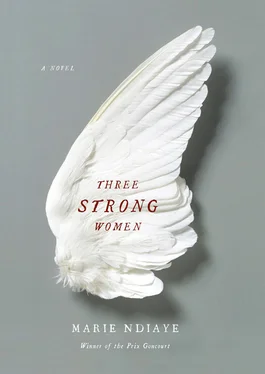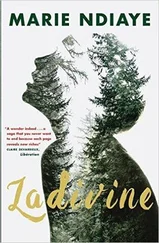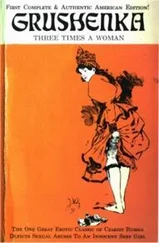What remained within him of the old Rudy Descas objected.
But he held fast, even if the start of a panic attack, a feeling of helplessness, now made him shiver.
He opened the car door and flopped onto the seat.
It was stifling inside the vehicle.
He tried, however, to take in a big lungful of this overcooked air to calm himself down and banish the fear, the awful fear that was creeping up on him at the thought that, if he admitted that the boys had not attacked him, he also had to concede that it was he, Rudy Descas, literature teacher at the Lycée Mermoz in Dakar, who’d hurled himself on one of them, prompting the two others to come to their friend’s aid.
True?
Yes, that’s what must really have happened, eh, Rudy?
His eyes began to fill with acrid tears.
He’d worked so hard at persuading himself of the contrary that he was no longer sure what was true and what wasn’t.
He was no longer sure.
He reached behind him, grabbed his old towel, and dabbed his eyes.
But could he glimpse the truth and not be afflicted by it?
Under the midday sun stretched the sizzling tar of the lycée’s vast courtyard.
Rudy Descas was leaving the premises, happy, with a spring in his step, a young teacher loved by his pupils and by his colleagues, who included his wife, Fanta, and he had no need then — Rudy said to himself without bitterness — no need to imagine himself some minister of divine will just to feel himself haloed with benevolence and an air of subtle triumph and refined ambition.
The tar was clinging slightly to the soles of his loafers.
The contact had filled him with joy and he was still smiling to himself as he passed through the school gate. This smile had spread like an involuntary gesture of benediction upon the three teenagers who were waiting in the meager shade of a mango tree, their faces shining in the midday sun.
The three were all pupils of his.
Rudy Descas knew them well.
He felt a particular affection for them because they were black and came from modest backgrounds. One of them, he understood, was the son of a fisherman in Dara Salam, the village where Rudy and his parents had once lived.
Sitting in his car in Manille’s parking lot, Rudy remembered what he always used to feel at that time, whenever his gaze fell on the fisherman’s son: an exaggerated, resolute, anxious friendship that bore no relationship to the boy’s particular qualities and that could suddenly turn to hatred without Rudy’s realizing it, or even understanding that hatred, until it was no longer friendship that he actually felt for his pupil.
For the boy’s face forced him to think of Dara Salam.
Horror-struck, he struggled against any vision of Dara Salam.
And this struggle mutated into a disproportionate affection for the teenager, an affection that was probably hatred.
But under the full midday sun of this unchanging, sweltering day in the dry season, as he was leaving the lycée happy and at peace with himself, his smile had enveloped the three boys equally, had flowed toward them, content, impersonal, with all the exquisiteness of an anointment.
Had the fisherman’s son suddenly managed to guess that Rudy Descas’s extreme kindness toward him was but a desperate way of containing the antagonism his Dara Salam face inspired in his teacher?
Was it that — the barely concealed hatred — which the teacher’s smile obviously conveyed in the off-white glare of the midday sun?
The hot air quivered.
No puff of wind shook the gray leaves of the mango tree.
Rudy Descas felt so lucky, so flourishing, in those days.
Little Djibril had been born two years earlier. He was a smiling, voluble child. His forehead was not marked with a puzzled frown. Unlike later … when he would feel afraid of his father and uncomfortable in his presence.
Rudy had applied for a teaching post at a foreign university and his final interview with the head of the department of medieval literatures had gone splendidly. He was in no doubt, so certain about the outcome, that, out of sheer vanity, he’d already phoned Mummy to tell her he’d gotten the job.
Your son, the guardian of your mature years, a university teacher with a doctorate in literature.
Yes, life was good.
Even if it wasn’t Fanta’s nature to say so, he was sure she loved him, and through him the life they’d made together in the fine apartment they’d recently rented in Le Plateau.
He occasionally felt that Fanta loved Djibril even more than she loved him — that she loved the child with a similar, but much stronger love — whereas he’d believed that her love for him would merely be different in kind, and that he wouldn’t lose out.
Now he thought he had lost out, that she’d rather drifted away from him.
But it scarcely mattered.
He then became so concerned about Fanta’s well-being that he accepted, even was pleased, that she was happy, even if it was rather at his expense.
So, yes, in this perfect life, it was only the memories of Dara Salam, which he had to struggle with every time he saw the teenager, that foreshadowed possible disaster ahead.
The young man had emerged from the shade of the mango tree, slowly, with effort, as if obliged to confront Rudy’s fearsome smile.
In a calm, clear, decisive manner, he shouted:
“Son of a murderer!”
And, Rudy had said to himself later — and now in Manille’s parking lot was once again saying to himself — that he’d been stabbed, literally, not just by what had been said but by the calm self-assurance in the voice of the boy, who hadn’t had the tact, hadn’t even taken the trouble, to insult him.
Without meaning to, the fisherman’s son had uttered nothing but the plain and simple truth, because that was what it was: the truth. Perhaps it was only the teacher’s smile, a false, suave smile, full of fear and hatred, that had allowed the truth to come out.
Rudy had dropped his briefcase.
Without knowing or understanding what he was going to do, he’d grabbed the boy by the throat.
Rudy was deeply shaken to feel under his thumbs the warm, moist, ringed tube of the boy’s windpipe. He remembered that more vividly than anything else, and as he squeezed the boy’s throat he recalled thinking only of the tender flesh of little Djibril, his son, whom he bathed every evening.
Without thinking, he stopped and turned his hands over and looked at them.
He seemed to feel again at the tips of his fingers, on the fleshy part of the first phalanges, that sensation of gentle resistance that had intoxicated him, and the floating, firm bump of the boy’s Adam’s apple that, drunk with exultant fury, he’d pressed so hard.
It was the first time in his life that he’d suffered such a fit of anger, the first time he’d hurled himself at anyone, and it was as if he was at last discovering his true nature, what he was made of and what gave him pleasure.
He’d heard himself groaning, gasping from the effort — unless it was the boy’s grunts that he mistook for his own.
He’d pushed the teenager into the lycée courtyard, still clutching his throat, which he was squeezing with all his strength.
The young man had begun to sweat profusely.
Enough, enough of being nice, repeated a small, ferocious, triumphant voice in Rudy’s head.
What had he said, the bastard?
“What’s that you said, eh? Son of a murderer? Okay, then let’s be true to our blood, eh?”
Were they of the same nature, the blood of his father’s partner that had stained forever the fine porous stone of the terrace, and Abel Descas’s own blood spattering the wall of his cell in Reubeuss prison, and the blood of this boy, the son of the Dara Salam fisherman, that would not fail to pour from his skull if Rudy managed to knock him over in the courtyard and then dash his head against the ground?
Читать дальше












